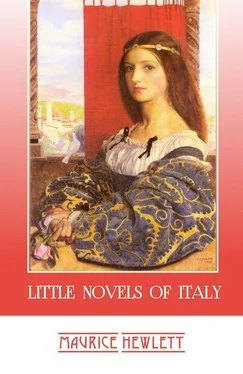The tall shepherd rose up by the help of the table, swayed and spoke. No one knew his voice again, hollow as it was like the sea-grumble.
"O Holiest, O Rose, O Stem of Sharon, O Tree of Carmel!" said he. "What wouldest thou with us sinners?"
And the woman at the door said, "My friends, I have no roof to my head; will you take me in? I am hungry; have you no meat for my child and me?"
The host in Stefano jogged the sinner to speak. "Surely, surely, sweet Lady! Surely, surely. I entreat your Graciousness to enter, to step in, to accommodate, to sit down, to be pleased to be easy, to—to—to—" inspiration failed him—"to sit down, in short," was his lame conclusion. His sweat (as he said next day) would have blinded any other man.
Through the backing ranks of the scared company—Robaccia leaning face to the wall, sobbing her heart out; Picagente, the hairy brigand, breathing short and hard; the shepherd, glorified, exalted, bursting with prophecy; two thieves at their prayers and a wanton taking the words from them—through such an assembly the Lady of the Peach-Tree (who else, pray?) walked to the table. A soft grey light from without filled the room; there was no need of a lamp, nor did any eye then on watch fail to see all that followed. Bread and wine were served by Stefano on bent knee; bread and wine (but sparingly) did the Lady eat from cup and platter. That cup, that platter, encased in gold leaves and crusted with turquoise, are to this day in the Treasury. Crutches have been cast before them, hearts innumerable burn about them. When she had finished she sat a little while with her white cheek against her hand, whispering words in an unknown tongue (they said, who knew no baby language) to the child on her lap. He lifted up a little hand, and, "Eh, my son, my son," she said, "wilt thou take of me?" Then she gave him the breast, while not a soul said anything but prayers for half an hour.
When the child slept the Lady folded up her dress, covered him with her cloak, and rose up in their midst.
"Only the poor love the poor," said she, in those low tones which all Verona came to know by heart, "and only they who have little to eat give to them that have less. My little son will bless you for your charity; and I, good friends, will pray my Master to reward you when He comes. Addio, addio , be with God."
Then she would have gone and left them crying had not Robaccia, the blowsy wench and good-for-naught, wailed aloud and caught her by the knees.
"Mother, mother, mother!" whimpered this hardy rascal, "bless me a little more than the others, a very little more! I am bad—eh, God, I am vile, enough!—but I will never let thee go save thou kiss me."
You could have heard the roomful of them catch breath together. Crucciacorda, the other woman, laughed horribly; the shepherd made a step forward to drag the slut away. But no! The light seemed to swell and grow towards that point where it threatens to be music, so charged with messages it is—it came undoubtedly from the heart of the Lady through her smile. For smile she did, as sweetly, as tenderly, as a breaking cloud. The sun of her smile was like a clean breath in the stivy den; and, behold, she took Robaccia by the hand and lifted her up, she encircled her with a mothering arm, and drew her close to her own breast. Her lips touched the bad girl's cheek, lingered for a moment there, wistfully withdrew; and Madonna of the Peach-Tree, none staying her now, went out into the dead street, and was seen no more of that company.
The sun at noon looked down upon Verona at peace, upon her citizens at their prayers. Never was such a scene in the stormy little city before. All the bells of all the churches pealed all day—with no lack of arms to pull them. Men and women ran to and fro kissing whom they met, with a "Save you, brother!" "Save you, sister! well met, well met!" The Grey Brethren, the Black Brethren, the White Brethren of Carmel, held hands, and confessed to each other as many sins as they had time to remember. Can Grande went unarmed about his own city, Bevilacqua unbarred his door, Giusti married his mistress, the bishop said his prayers. The cripples at the church doors had no need to whine. As for the tavern of the Golden Fish, it smelt of lavender and musk and bergamot the day through. At one time there were eight litters with their bearers, eleven stallions, trapped and emblazoned, held by eleven grooms in livery, outside its door. The ladies of the litters were in the room upon their knees; the knights of the horses, their great helmets on their backs, knelt in the kennel praying devoutly. The wail of "Dies Iræ" went down the Corso and up again, "Salve Regina" wavered over the sunny spaces of the Brà. In the amphitheatre, after an open-air mass, the Cardinal-Legate solemnly exposed the relics of last night's miracle, and a bodyguard of twenty noble youths, six chaplains, and a Benedictine abbot went to the suburb to escort into the city the curate with the Peach-stone. It was a glorious day, never to be forgotten in the annals of Verona. Charity and the open heart went side by side with compunction and the searching of the heart. Tears were shed and kissed away; kisses induced the fall of gentler tears. It might be stoutly questioned whether Verona held one unshriven soul, one sin unspoken, or one solace unawarded.
It might be reasonably questioned, yet it must be denied. Within the walls of the friars of Mount Carmel were two uneasy spirits. Fra Sulpicio, the fat prior, was extended face downwards before the high altar; Fra Battista, the eloquent preacher, chewed his thumb in his cell. The pittanciar, on the other hand, was of the common mind. He was ambling down the Via Leoni with Brother Patricio of the Capuchins on one arm and Brother Martino of the Dominicans on the other, singing "In Exitu Israel" like a choir-boy. But the prior, who had half believed before, was sobbing his contrition into the pavement, and Fra Battista was losing faith in himself, the only faith he had.
VII
LAST CONSIDERATIONS OF CAN GRANDE II
You are not to suppose that the spectacle of Verona garbed in a gown of innocence, singing hymns and weaving chaplets of lilies, was to go unnoticed by the ruling power. Can Grande II. was lord of Verona, a most atrocious rascal, and one of many; but, like his famous ancestor and namesake, he had a gibing tongue, which was evidence of a scrutiny tolerably cool of the shifts of human nature. Human nature, he had observed, must needs account to itself for itself. If it met with what it did not understand, it was prompt to state the problem in a phrase which it could not explain. The simplicity of the plan was as little to be denied as its convenience was obvious. It was thus that Can Grande II. understood the emotions of Verona; it was thus, indeed, that he himself, confronted with statements and an explanation which did not satisfy him, accounted to himself, like any mother's son of his lieges. He explained their explanation, but only by another inexplicable formula. The energy with which he expounded his own view to those about him betrayed, perhaps, a lurking uneasiness in the burly tyrant.
"Pooh, my good lord," said he to the bishop, who had come full of the day's doings and night's report, "don't you know your own flock better than this? Did you ever hear a man with a broken limb attribute his mishap to other than Domeneddio? However drunk he may have been, however absurdly in a hurry—act of God! If it thunder and lighten of a summer night, if it turn the milk—a judgment! Luckily Monsignore has broad shoulders by all accounts; per Bacco! —He had need. Now then, look at this case. A belated woman with a baby stumbles upon a company of shepherds all in the twittering dark. Hearts jump to mouths, flesh creeps, hairs stand tiptoe—Madonna, of course! Whom else could they call her, pray? They don't know the woman: name her they must. Well! Who is there they don't know whose name comes readiest to the tongue? Madonna, of course. Good: Ecco Madonna! "
Читать дальше











